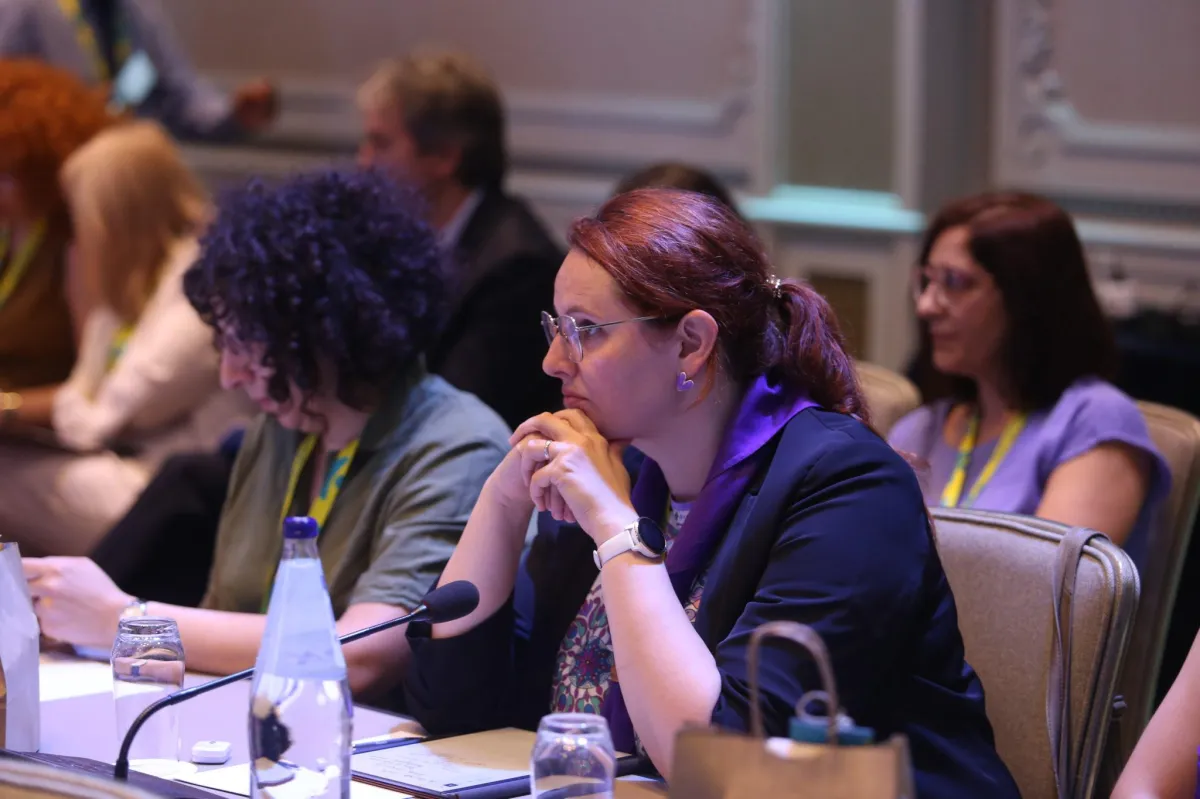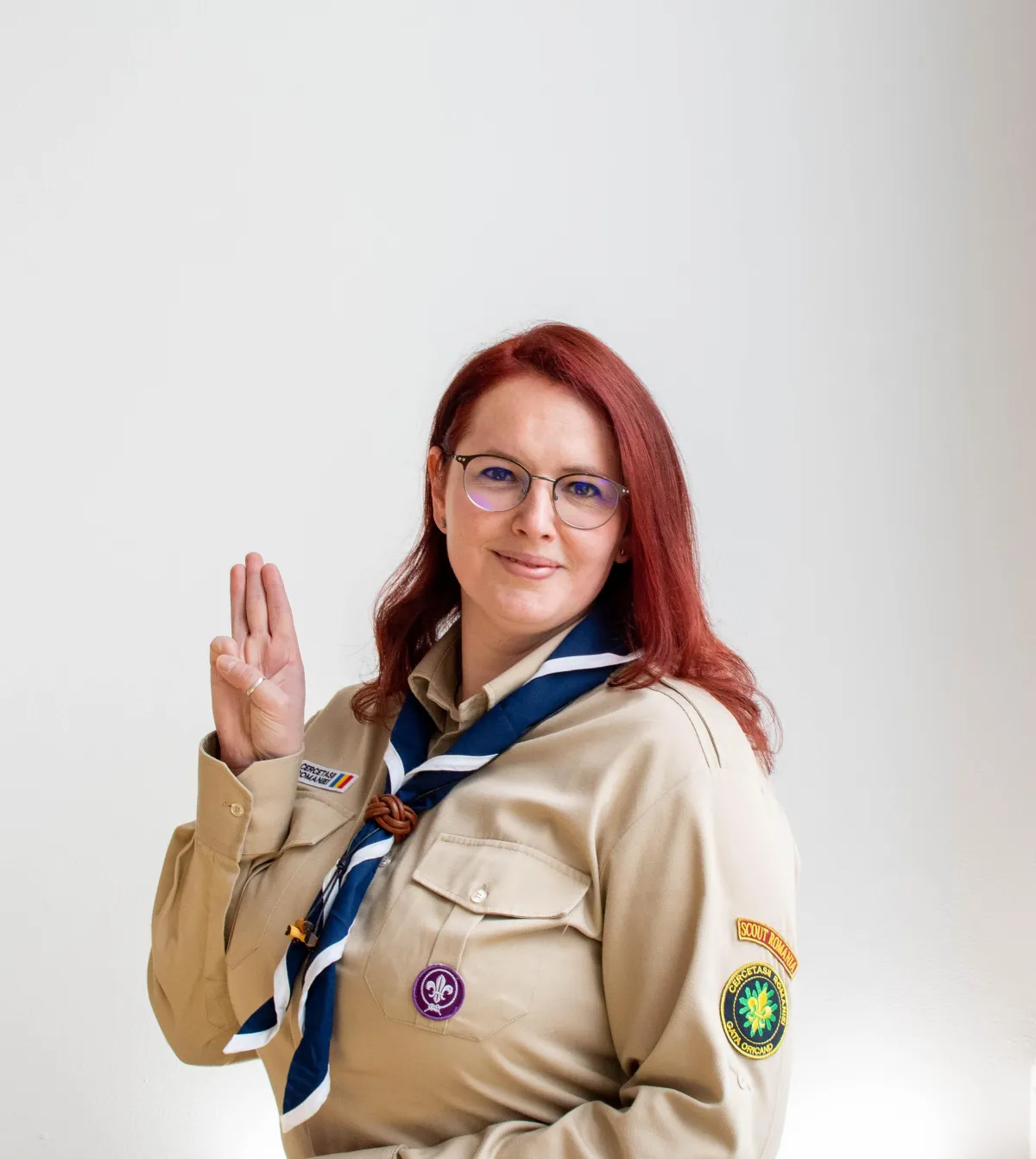Thoughts and perspectives..
Diana Slabu

Scouting and Entrepreneurship education - is there a link?
In June 2024, I participated at the UNECE Forum in Cyprus, representing the European Scout Region together with one of our External Representatives, Lilla Gyorffy. The topic of the forum was Education for Sustainable Development, and one of the sub-topics was Entrepreneurship Education.
This got me thinking about the overlap between Entrepreneurship Education and Scouting, as I, myself, as a Scout leader, have watched a lot of my own scouts (from my local group and other local groups as well) take the Entrepreneur path as they grew up and started working. Yes, it is not the main purpose of scouting, but building character, skills for life and helping them know themselves better, is definitely contributing to them having better chances at a successful career, whatever it might be. As we definitely don't have any statistics on how many of our members take which career path yet, I thought I might add a few more insights, that might spark the curiosity for further research.
The topic was tackled from multiple points of view. The first one was from a Formal Education perspective, and an example from North Macedonia caught my eye.

This model showcased a curricullum that was implemented for high-school students, from ages 14 to 18. If we analyse it, just for fun, (by looking at the terrible photo on the right), we can see that some of these topics are also tackled in scouting:
Community action projects - identifying the needs of the community
Connection with Global economic opportunities that have been discovered (see local programmes with an impact at global level and vice-versa)
Innovation and creativity and managing the creative process
Some elements of personal financial management and project management
This varies from group to group and from one national youth programme to another, of course, but when scouts, ventures and especially rovers start coming up with ideas and implementing their own projects, they do need added support on interconnected topics, such as how to develop a project from identifying needs of the community to implementation, basic budgeting skills and communications, and this is a huge element of empowerement for them, especially when linked to a topic they feel very passionately about.
On the other hand, another input that I particularly liked was a plenary session from NFTE (Network for Teaching Entrepreneurship) and this was on the importance of the Entrepreneurial Mindset. (see below)

When we look at what are the elements needed in order to build an Entrepreneurial Mindset, we definitely see a lot of common points with scouting (one might even say all of them are aspects many of our local groups strive continuously to work on).
✅Initiative and self-reliance
✅Flexibility and Adaptability
✅Communication and collaboration
✅Creativity and Innovation
✅Future orientation
✅Critical Thinking &Problem Solving
✅Opportunity Recognition (on this one we might need to work a bit more)
✅Comfort with Risk (likewise, on this one, pushing the limits of the comfort zone into the learning zone, while also keeping it safe, is one of the recurrent discussions in scouting)
Another inspiring guest speaker was Prof. Susan Mueller from Bern University, Professor on Entrepreneurship Education, that explained the progress made on this topic and linked it to the 4C's of Learning for the 21st Century - the most vital skills that we are also working on, in scouting: Collaboration, Communication, Creativity and Critical Thinking.
This leads me to my conclusion: While it is not our main objective, Scouting gives young people skills that build an Entrepreneurial Mindset, making them extremely valuable not just as entrepreneurs (which some do decide to become) but also as employees, managers and team members, or leaders, as scientists, doctors, researchers, artists or social media influencers, in short, whatever career path(s) they choose.
These kinds of skills are also what makes them harder to replace in the job-market by AI and technology in the future, and this is to be taken into account, as it is estimated that aproximately 65% of children enrolling in education now might end up working in jobs that don't yet exist (or will change dramatically compared to now) by the time they finish education (World Scout Economic Forum).
So, you will ask, did we have anything to contribute with, to this event?

We did. Scouting has many examples of programmes on Education for Sustainable Development (Scouts for SDGs is only one of them) and we did a lot of work in reminding everyone of the important role Non-Formal Education has in being a partner to Formal Education, ministries and the business sector, in equipping kids and young people with the skills they need for the 21st Century.
So, I would ask, in your local group, are you building any of these skills through your scout programme? If you're not, reflect on the above and be brave to trust your scouts more and support them as they try new things. Our most common mistake, as scout leaders, is to try and give too much framework, underestimating the capacity of creativity, decision-making and management of children and young people once they are in the right environment.
P.S. For my fellow educators, a cool tool that I discovered a bit late, to design competency-based programmes is the Scaffold tool - also a card game - check it out.
Disclaimer: This text does not represent an official position of World Scouting or the European Scout Region

Scouting and Entrepreneurship education - is there a link?
In June 2024, I participated at the UNECE Forum in Cyprus, representing the European Scout Region together with one of our External Representatives, Lilla Gyorffy. The topic of the forum was Education for Sustainable Development, and one of the sub-topics was Entrepreneurship Education.
This got me thinking about the overlap between Entrepreneurship Education and Scouting, as I, myself, as a Scout leader, have watched a lot of my own scouts (from my local group and other local groups as well) take the Entrepreneur path as they grew up and started working. Yes, it is not the main purpose of scouting, but building character, skills for life and helping them know themselves better, is definitely contributing to them having better chances at a successful career, whatever it might be. As we definitely don't have any statistics on how many of our members take which career path yet, I thought I might add a few more insights, that might spark the curiosity for further research.
The topic was tackled from multiple points of view. The first one was from a Formal Education perspective, and an example from North Macedonia caught my eye.

This model showcased a curricullum that was implemented for high-school students, from ages 14 to 18. If we analyse it, just for fun, (by looking at the terrible photo on the right), we can see that some of these topics are also tackled in scouting:
Community action projects - identifying the needs of the community
Connection with Global economic opportunities that have been discovered (see local programmes with an impact at global level and vice-versa)
Innovation and creativity and managing the creative process
Some elements of personal financial management and project management
This varies from group to group and from one national youth programme to another, of course, but when scouts, ventures and especially rovers start coming up with ideas and implementing their own projects, they do need added support on interconnected topics, such as how to develop a project from identifying needs of the community to implementation, basic budgeting skills and communications, and this is a huge element of empowerement for them, especially when linked to a topic they feel very passionately about.
On the other hand, another input that I particularly liked was a plenary session from NFTE (Network for Teaching Entrepreneurship) and this was on the importance of the Entrepreneurial Mindset. (see below)

When we look at what are the elements needed in order to build an Entrepreneurial Mindset, we definitely see a lot of common points with scouting (one might even say all of them are aspects many of our local groups strive continuously to work on).
✅Initiative and self-reliance
✅Flexibility and Adaptability
✅Communication and collaboration
✅Creativity and Innovation
✅Future orientation
✅Critical Thinking &Problem Solving
✅Opportunity Recognition (on this one we might need to work a bit more)
✅Comfort with Risk (likewise, on this one, pushing the limits of the comfort zone into the learning zone, while also keeping it safe, is one of the recurrent discussions in scouting)
Another inspiring guest speaker was Prof. Susan Mueller from Bern University, Professor on Entrepreneurship Education, that explained the progress made on this topic and linked it to the 4C's of Learning for the 21st Century - the most vital skills that we are also working on, in scouting: Collaboration, Communication, Creativity and Critical Thinking.
This leads me to my conclusion: While it is not our main objective, Scouting gives young people skills that build an Entrepreneurial Mindset, making them extremely valuable not just as entrepreneurs (which some do decide to become) but also as employees, managers and team members, or leaders, as scientists, doctors, researchers, artists or social media influencers, in short, whatever career path(s) they choose.
These kinds of skills are also what makes them harder to replace in the job-market by AI and technology in the future, and this is to be taken into account, as it is estimated that aproximately 65% of children enrolling in education now might end up working in jobs that don't yet exist (or will change dramatically compared to now) by the time they finish education (World Scout Economic Forum).
So, you will ask, did we have anything to contribute with, to this event?

We did. Scouting has many examples of programmes on Education for Sustainable Development (Scouts for SDGs is only one of them) and we did a lot of work in reminding everyone of the important role Non-Formal Education has in being a partner to Formal Education, ministries and the business sector, in equipping kids and young people with the skills they need for the 21st Century.
So, I would ask, in your local group, are you building any of these skills through your scout programme? If you're not, reflect on the above and be brave to trust your scouts more and support them as they try new things. Our most common mistake, as scout leaders, is to try and give too much framework, underestimating the capacity of creativity, decision-making and management of children and young people once they are in the right environment.
P.S. For my fellow educators, a cool tool that I discovered a bit late, to design competency-based programmes is the Scaffold tool - also a card game - check it out.
Disclaimer: This text does not represent an official position of World Scouting or the European Scout Region

Would love for you to share your views on this with me!
Do you want to discuss and share your view on this topic? I would love for you to Get in touch!

Goal Setting
Vestibulum ac diam sit amet quam vehicula elementum sed sit

Relationship Coaching
Vestibulum ac diam sit amet quam vehicula elementum sed sit

Stress Management
Vestibulum ac diam sit amet quam vehicula elementum sed sit

Career Advice
Vestibulum ac diam sit amet quam vehicula elementum sed sit
If you are curious, like me, and want to know more, just send me a message!




